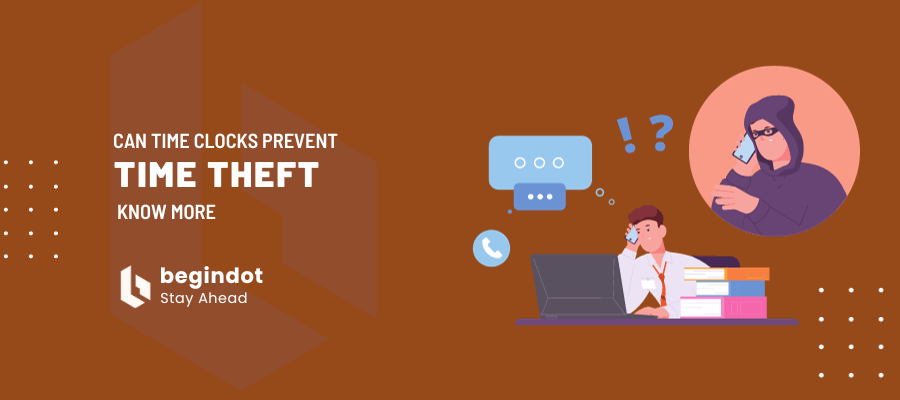Time clocks and time theft are bound in a relationship that defies easy answers. While some see these devices as the ultimate solution to mismanaged time, others remain skeptical.
Unpacking this relationship opens the door to new viewpoints on effective business management. If you are managing a remote business, how to track the time of your employees becomes very important.
How Time Theft Occurs
Time theft occurs when employees receive payment for hours they haven’t worked. Forms include taking longer breaks, arriving late, or leaving early without correcting their time records.
Both intentional and accidental actions can result in lost revenue for businesses.

The Economic Toll on Businesses
Time theft can severely impact a company’s bottom line. Employees committing time theft cost businesses significant amounts of money over time.
This isn’t just a problem for large corporations; small businesses also grapple with time theft, and for them, the impact can be more pronounced.
Time Clocks as a Deterrent
One way to deter time theft is by implementing an accurate time-keeping system. Traditional punch clocks have given way to more advanced systems.
With an online time clock, employees can log their time more precisely. These systems often come equipped with features such as biometric scans and GPS tracking that make it more difficult for employees to manipulate their work hours.
Biometric Time Clocks
Biometric time clocks require unique biological traits like fingerprints or eye scans for clocking in and out. This eliminates buddy punching, a common form of time theft where employees clock in or out for each other.
GPS Tracking
Some advanced time clocks incorporate GPS tracking. This is particularly useful for businesses with remote or mobile employees.
GPS-enabled time clocks ensure that employees are indeed where they claim to be during their work hours.
Analytical Tools
Many modern time clock systems come with analytical tools that can help employers identify patterns indicative of time theft.
By analyzing the data, an employer can spot inconsistencies in an employee’s time records, such as frequently clocking in late or taking long breaks.
Employee Accountability
Time clocks make it easier for employees to manage their time more effectively. When employees know their time is being accurately tracked, they’re less likely to engage in time theft.
A culture of accountability can improve not only time management but also overall productivity.
Ethical Concerns
While time clocks can effectively deter time theft, it’s important to address ethical considerations. The implementation of highly advanced time-tracking systems might raise concerns about employee privacy.
Employers should aim to strike a balance between tracking employee time and respecting their privacy.
Legal Considerations
Implementing a time clock system must be in compliance with labor laws. Employers should consult with legal professionals to ensure that their time clock system doesn’t violate any existing laws or regulations.
Costs vs. Benefits
Investing in a state-of-the-art time clock system might appear expensive at first, but the long-term benefits often outweigh the costs.
By reducing time theft, businesses can save a substantial amount of money in the long run, which makes the initial investment worthwhile.
Evaluating Effectiveness
Once a time clock system is in place, it’s important to periodically evaluate its effectiveness. Employers can look at key metrics such as overall productivity and employee attendance before and after the implementation of the time clock system. Any noticeable improvements can be attributed, at least in part, to the new system.
Transparency and Communication
Clear communication between management and employees is key when introducing a new time clock system. Employees should be informed of the reasons behind the new system, how it works, and how it will benefit both them and the organization.
Transparency during this process can prevent misunderstandings and improve acceptance rates among staff.
Implementation Strategies
Proper implementation is essential for the time clock system to be effective. Companies need to carefully plan the rollout, provide adequate training for employees, and designate staff members who will manage and maintain the system.
Even the most advanced system can fail if it’s not implemented correctly.
Addressing Employee Resistance
It’s not uncommon for employees to resist new technologies or methods, especially those designed to monitor their activities. Employers should be prepared for this and address any concerns that arise.
Open forums, FAQs, or one-on-one discussions can help employees feel more comfortable with the new system. It’s important for them to understand that the system is not just a means of surveillance but a tool that can benefit everyone.
Keeping Systems Up to Date
Technology is ever-changing, and time clock systems are no exception. Regular software updates and occasional hardware upgrades are needed to ensure that the system remains effective and secure.
It’s advisable for businesses to have a maintenance plan in place and to keep abreast of advancements in time management technology.
The Bottom Line
Time clocks can indeed serve as a line of defense against time theft. A judicious choice of technology can not only detect but deter unethical practices, contributing to a culture of honesty and accountability in the workplace.








